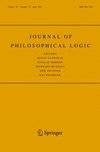A Logical Analysis of Instrumentality Judgments: Means-End Relations in the Context of Experience and Expectations
IF 0.7
1区 哲学
0 PHILOSOPHY
引用次数: 0
Abstract
Abstract This article proposes the use of temporal logic for an analysis of instrumentality inspired by the work of G.H. von Wright. The first part of the article contains the philosophical foundations. We discuss von Wright’s general theory of agency and his account of instrumentality. Moreover, we propose several refinements to this framework via rigorous definitions of the core notions involved. In the second part, we develop a logical system called Temporal Logic of Action and Expectations ( $$\textsf{TLAE}$$工具性判断的逻辑分析:经验与期望背景下的手段-目的关系
摘要:受赖特(G.H. von Wright)的启发,本文提出用时间逻辑分析工具性。文章的第一部分包括哲学基础。我们讨论了赖特的代理的一般理论和他的工具性的说明。此外,通过对所涉及的核心概念的严格定义,我们提出了对该框架的若干改进。在第二部分,我们开发了一个逻辑系统,称为行动和期望的时间逻辑($$\textsf{TLAE}$$ TLAE)。该逻辑的灵感来自于基于不确定时间的命题动态逻辑的片段。证明了系统相对于其给定语义是弱完备的。然后,我们使用$$\textsf{TLAE}$$ TLAE来形式化和分析本文第一部分中定义的工具关系。最后,我们指出了我们工作的哲学意义和可能的扩展。
本文章由计算机程序翻译,如有差异,请以英文原文为准。
求助全文
约1分钟内获得全文
求助全文
来源期刊

JOURNAL OF PHILOSOPHICAL LOGIC
PHILOSOPHY-
CiteScore
2.50
自引率
20.00%
发文量
43
期刊介绍:
The Journal of Philosophical Logic aims to provide a forum for work at the crossroads of philosophy and logic, old and new, with contributions ranging from conceptual to technical. Accordingly, the Journal invites papers in all of the traditional areas of philosophical logic, including but not limited to: various versions of modal, temporal, epistemic, and deontic logic; constructive logics; relevance and other sub-classical logics; many-valued logics; logics of conditionals; quantum logic; decision theory, inductive logic, logics of belief change, and formal epistemology; defeasible and nonmonotonic logics; formal philosophy of language; vagueness; and theories of truth and validity. In addition to publishing papers on philosophical logic in this familiar sense of the term, the Journal also invites papers on extensions of logic to new areas of application, and on the philosophical issues to which these give rise. The Journal places a special emphasis on the applications of philosophical logic in other disciplines, not only in mathematics and the natural sciences but also, for example, in computer science, artificial intelligence, cognitive science, linguistics, jurisprudence, and the social sciences, such as economics, sociology, and political science.
 求助内容:
求助内容: 应助结果提醒方式:
应助结果提醒方式:


